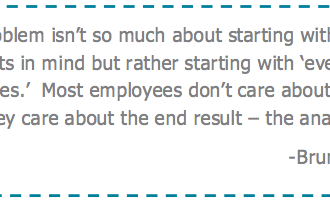A project can fail for any number of reasons — some of which are in your control, some of which aren’t. In fact, I came across this fairly depressing list of 101 Common Causes of Project Failure. (Yikes.) With any project, there are always going to be factors outside your control, but by paying attention to some of the most common reasons projects fail, you can greatly increase your odds of being a success.
1. No clear objectives.
This almost sounds like a joke, doesn’t it? But in my work with clients all over the globe, I have been a witness to countless projects that founder because of a lack of clear objectives and metrics by which to measure their success. Often a project’s goal boils down to “make it better,” with no clear vision of what better looks like or how anyone will know when it has been achieved. Avoid this failure by clearly setting out measurable quantitative and qualitative objectives of the project at the very beginning.
2. No milestones.
The kid brother to having no objectives is having no milestones. Without milestones, team members can’t be sure if they’re on track to meet the ultimate deadline or budget, which can cause things to get out of control quickly. Rather than having just one objective, creating stepping stones to reaching that ultimate goal can ensure the project stays on track and give team members important successes to celebrate along the way. Avoid this failure by plotting out the major milestones your team will achieve on their way to the ultimate goal, and building in a method for checking in on progress toward those milestones.
3. Budget problems.
Oh, if I only had a penny for every project I’ve seen fail because of budget problems! Sometimes budget problems are outside your control, but what you can control is creating a thoroughly researched and realistic budget for the project, and managing expectations around that budget. Too often project leaders are bullied into creating unrealistic budgets on paper that can never be met in the real world, which leads to disappointment and outright failure when the project comes in massively over budget — or is never finished at all. Avoid this failure by making sure you think through every aspect of your budget carefully, and manage expectations from outside sources as to what can be achieved based on the budget you’ve been given.
4. Lack of resources.
So many project problems fall under this category, yet it can be the most easily avoided. If you spend the right amount of time planning your project, understanding your objectives and milestones, and creating a realistic budget, then planning for how you will obtain all the necessary resources should come easily. (Notice how each of these steps builds on the ones before?) Lack of resources is usually due to one thing: lack of planning. Avoid this failure by carefully researching, thinking through, and understanding the resources you will need at each stage of your project, and working them into the plan from the very beginning.
5. Poor management.
Interestingly, you can have a perfect project plan, but poor management can throw a huge spanner in the works and ruin a good plan. Good management involves understanding and communicating the project’s goals and milestones, keeping abreast of the progress being made at every stage of the project, and managing expectations of both project team members and anyone to whom the manager reports. Poor management in any of these areas can send the project spiraling towards failure. Avoid this failure by understanding your own role as manager and actively managing your project and team.
6. Scope creep.
Too often a project begins with one objective and ends up trying to solve the world’s problems (or at least, the company’s). Even if you have a properly defined objective, outside forces can influence the project’s trajectory, asking for more features, more benefits, more, more, more. What was once a project to solve a single specific problem has now grown into a huge, multi-headed beast with no clear direction. Avoid this failure by constantly asking yourself and your team if any change is necessary to the original objective. Avoid shiny object syndrome and stay focused on achieving your original goals. All those good ideas will still be there for the next project. Of course, these are just a few of the most common reasons why I see projects fail, but by considering them in advance of your next project, and taking the time to plan for these contingencies, I am sure you’re ensuring a much higher chance of success for your next project, no matter how big or small.








